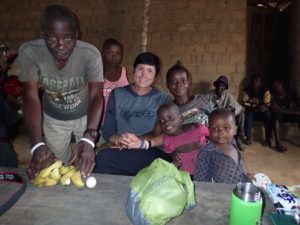This summer, I flew into the heart of the Democratic Republic of Congo (DRC) with Dr. Takeshi Furuichi and Dr. Chie Hashimoto to observe wild bonobos at the Luo Scientific Reserve, the original bonobo research station started in the 1970s by Dr. Takayoshi Kano.
The reserve is located in the village of Wamba. To get there, you take a beautiful but slightly scary four-hour propeller plane ride over the rainforest canopy from the capital, Kinshasa, and then a four-hour motorbike ride on narrow paths.
Once safely in Wamba, I met the most incredible Congolese trackers and workers. These folks are living in one of the most remote villages on the planet and the best-paying job around is tracking wild bonobos.
The Luo Scientific Reserve is in the heart of Congo in the middle of bonobo territory, where bonobos have thrived for millions of years. It is so isolated that while there, I never saw a car. There is no running water, very little solar powered electricity in the village outside of the research station, no refrigerators except for one in the hospital for vaccinations, no toilets and no cell service. And it was glorious!
The staff of about 30 local Congolese support the research station with one paid job or another so that researchers (5-10/year) can work and survive while they diligently conduct their studies with approximately 100 wild, yet habituated, bonobos.

Ashley Stone (center) meets with locals in Wamba. (Photo: Luo Scientific Reserve)
Dr. Takeshi Furuichi and his team have partnered with a local environmental organization called CREF (Center for Research in Ecology and Forestry) to offer a variety of employment opportunities to the locals, funding for community improvement projects and support for bonobo habitat protection in exchange for taking care of the needs of the researchers while they are there and tracking the bonobos daily. Both parties are helping each other.
The trip was exhilarating, exhausting, and educational. But above all, it was an existential experience. The more involved I become in conservation, the more I realize this work is more about the people than the species.
Most of the people in the DRC face extreme poverty. It might be the richest country in natural resources, but the DRC is the second poorest country on earth, with 70 percent of the population of 80 million people living on a little over $1 a day. I saw and felt the desperation firsthand, which was overwhelming and very real.
Most organizations focused on species or habitat preservation understand that successful projects have to be a win-win-win. The project will realize their goals only if the people benefit by protecting the animal or environmental issue at hand. For example, while at Wamba I met two anthropologists working out of the bonobo research station to help local Congolese get caterpillars to larger markets during the season. If they are successful, the people will have more income from sustainable caterpillar harvesting that they wouldn’t have had otherwise. The formula is simple:
No bonobos = no research station = less economic opportunities.
As I reflect on my trip to the DRC this summer, I’m filled with equal parts gratitude and awe. Gratitude for the opportunity to have this once-in-a-lifetime experience and awe at the strength, beauty and grace of the Congolese people.
After almost two years of preparation and planning, the dream of trekking into the rainforest of the Congo Basin to observe wild bonobos and meet the folks responsible for their protection came true and exceeded my wildest imagination in every way.
I look forward to sharing more stories and learnings with you through The Bonobo Diaries Blog. I will be forever indebted to Dr. Takeshi Furuichi for inviting me on this journey of self-discovery to see the precious wild bonobos. I hope you’ll celebrate the second World Bonobo Day on February 14, 2018 with me!



